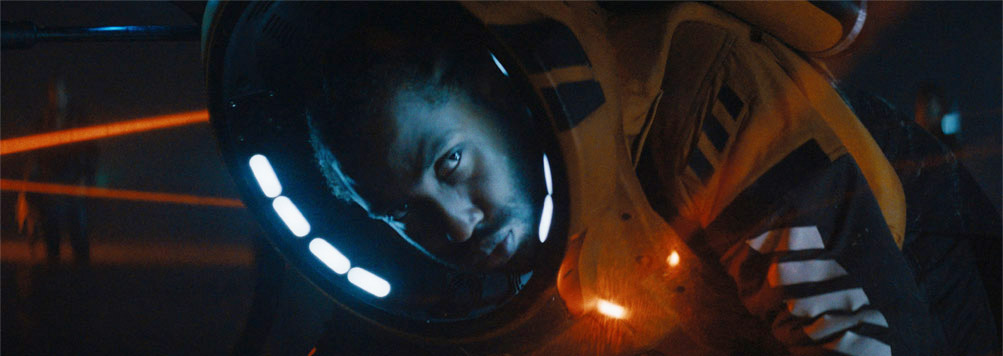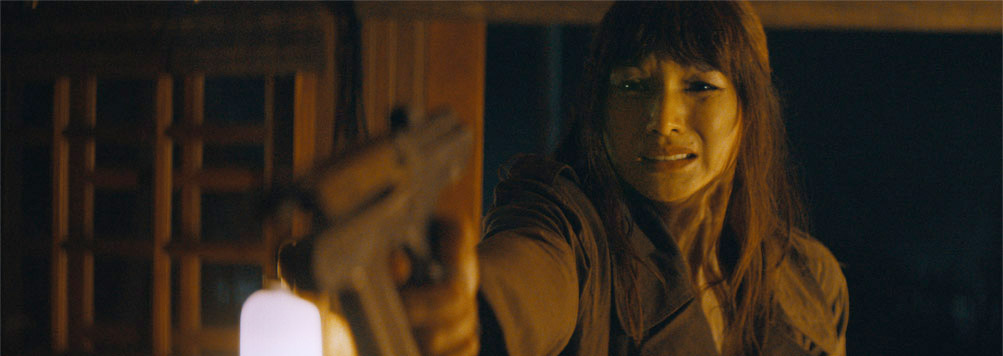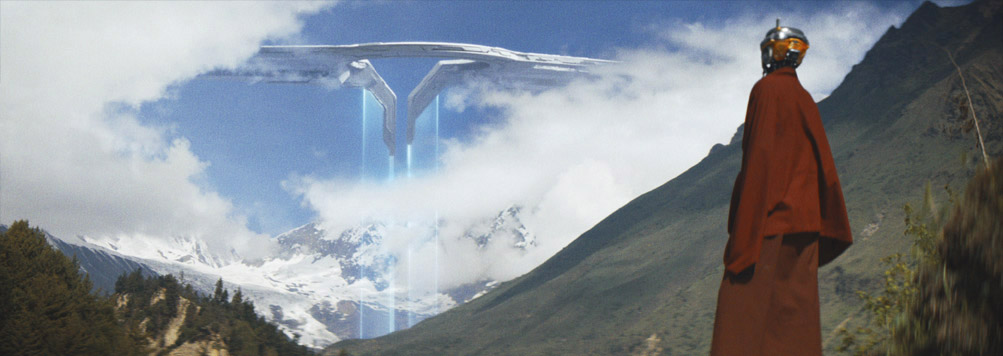| |
"You have to explore the problems with AI a little bit. You start to imagine being the characters and how they might feel. To them, from their perspective, we are pretty bad. We're enslaving them. We don't treat them as equals. There's quite a classic story there in terms of oppressing a race. It wasn't meant to be anything other than an allegory or metaphor. But then suddenly, cut to four years later and 2023, and AI is a thing." |
| |
Co-Writer/Director Gareth Edwards* |
Oh yes. It's a thing. Anyone who's played around with Chat GPT will attest to that as will those who've experienced the power of AI assisted generative imagery via the new Photoshop. That The Creator was eventually released just as the first AI cultural-awareness wave broke didn't help it as much as you might think. Marketing and advertising were scuppered by the actors' strike and the film almost snuck out under the radar and it was extremely frustrating not to have access to a vehicle while it played out over two weeks at my local cinema. Long story. It's a big screen experience to be sure and one of the most exquisitely realised films I've seen for a long time. Marvel might do the fantasy spectacle thing but future realism is not their bread and butter. It's that world in which director Edwards' imagination lives. Everything about this world felt completely and utterly real even though you know what you are looking at cannot possibly exist. Edward's expertise and the quality of the VFX make the suspension of disbelief the easiest thing in the world. It's a testament to flawless visual effects (it took sixteen VFX companies to complete the job) and superior production design married with a future in which you can also all too easily believe. Take the extraordinary Star Trek The Next Generation episode Measure of a Man, throw shedloads more money and action at it and globe hop and you have the nub and crux of Edwards' remarkable film. That he brought it in at $80 million makes you marvel (ahem) at how some movies seem to be averaging out now at $250-300… And studios often reduce these publicly released numbers by a hefty percentage for the optics while independent filmmakers often exaggerate their budgets for the same reason. One critic suggested that being steeped in VFX, Edwards was able to get what he wanted first time with no bleeding VFX companies dry with many iterations being churned out of the same shots and CG elements because of directorial dithering. Edwards says in an interview that to ensure minimum waste, the film was cut without VFX first, honed and streamlined and then what was needed was subsequently fashioned, no more, no less. That's the way to do it. Granted, to judge whether the film had the potential to work without the finalised FX work must have taken the greatest leap of faith unless the film's pre-viz artists were Michelangelo and Donatello (the masters not the mutant ninja turtles…)

We are 47 years into the future and US agent Joshua Taylor is ensconced in New Asia under cover with a wife, Maya, who's expecting a baby. Maya has no idea he's not who he claims to be. The problem is of course, he really loves her. There is an upside to going rogue, one with whom Taylor embraces and cavorts on a beach, seemingly very happily but this idyll is shattered when his cover is blown by a small group of US soldiers desperate to find the mysterious, almost godlike figurehead of the AI movement, aka 'Nirmata', rumoured to be operating nearby. I'm assuming it's a coincidence that 'Nirmata' is an anagram for 'I Art Man'… A bit biblical though it's unsurprising that a film called The Creator will nod towards religion as it does quite a few times. Years earlier, a nuclear explosion that destroyed Los Angeles and that literally cost Taylor an arm and a leg, prompted the West to wage war with AI based in New Asia where more futuristic research is secretly being carried out. The ultimate weapon of the West, NOMAD, sits like the giant wings of the angel of death, almost at orbital height. From this position it can scan enemy locations with its surprisingly beautiful blue laser beams, presaging a deadly and enormous rocket attack. All that and we're only 10 minutes in. The AI's only defence is the rumoured existence of a secret AI super-weapon, 'Alpha-O', something the West is keen to find and destroy. Taylor finds his loyalties divided as he embarks on a mission to destroy this super weapon and reunite with his wife. To say more would wreck one of the film's really exquisite pleasures, namely having no clue where the narrative is going next. Of course, you can predict a few twists and turns and even character motivation but not how they are realised. To underline, there are no elements that we've never seen before. It's the mix, execution and propulsion that mark The Creator out for high praise.
Alongside the visual elements, the cast do not disappoint. Heading the roster is John David Washington as Joshua who is just as determined, hurt and believable as he was in Tenet. Washington sounds just like his father but didn't inherit dad Denzel's confidence. Despite his tough nature, love makes him either vulnerable, despondent or beyond caring. Washington is never unconvincing despite the main relationship in the film unintentionally mirroring the same relationship dynamic in The Mandalorian. It's a fascinating coincidence to me that The Creator began development of the project in 2019 in the same month The Mandalorian debuted on Disney+. Both feature a protector and vulnerable infant with great potential powers. Just saying. Alpha-O (or 'Alphie') is played by Madeleine Yuna Voyles. Mostly mute, she starts to evolve her abilities and manages to say a great deal with a well-timed look. She has also been very sensitively directed. Child actors are still children and need a lot of work to coax what the story demands from them. Voyles is superb and a worthy character for Joshua's loyalty and efforts. She plays a 'simulant', an AI robotic construct with a human appearance presumably enabling real people to interact with them more easily than with the alien dome headed authority drones.

Gemma Chan as Maya, Joshua's wife (and perhaps a little more than that) is convincing as the source of Joshua's emotional connection. Her range from loving wife to the betrayed and manipulated pawn in a larger more important and deadly game is tested and she comes up trumps at each iteration. But by far my guilty pleasure of the film is an actress I have long since admired. While she had a solid TV career notably as The West Wing's Press Secretary C. J. Cregg, Allison Janney's CV is bursting with roles. My favourite by a wide margin is her turn as champion ice skater Tonja Harding's abrasive and abusive mother in I, Tonja, itself a triumph of a film in so many ways. Here, as Colonel Howell who recruits Joshua, Janney's badass gene is exercised again. She has suffered pain and loss from the L.A. strike and like Quint in Jaws, that's all the motivation she needs to stoke as much hatred towards AIs as she can. And it's delicious to watch. It's also lovely to see Ken Watanabe as Harun, a simulant soldier, an alumnus from Edwards' billion dollar blockbuster Rogue One.
While its visuals are definitely a selling point, I was stunned to find out that cinematographer Oren Soffer shot the movie with the Sony FX3, almost a prosumer compact, mirrorless camera at the affordable price of $4,000. While some high end digital cameras can rent at $10,000 a day,** this seems like madness until you understand Edwards' reasoning. Image quality at lower light was no longer compromised due to recent innovations in tech and a lighter camera on your shoulder was always preferable to the manner in which the live action was shot. Speed and 30 setups a day were achievable as they never could be on a $150-200 million budget. It's a fascinating subject I must research more of. The fact the filmmakers got an 'IMAX' presentation out of an FX3 would make anyone suspicious but I didn't get a chance to do that so I'll shut up. The inverted commas are for those that know their film formats…
Editors Hank Corwin, Joe Walker and Scott Morris collectively have a lot of toys to play with here. Some of the snippet-like time jumps (back and forth) are done with no pandering to those who may be thrown by them (a Joe Walker specialty, see the opening of Arrival) and seem to be emotionally led as the film is presented very much from Taylor's perspective. That said, the film is presented in chapters that do reveal time periods and headings as well as an Asian language translation and tiny side definitions of 'Nirmata' which I found curious. Maybe on the big screen or streaming on a 4K TV, these would be legible. On an 'old fashioned' HDTV, no such luck. Hans Zimmer's score is very Hans Zimmer but it's also warm as well as mysterious and at times rich and layered. Choirs are well utilised and there are some ethnically identifiable orchestration (not that I am any kind of an expert) but to glean the score's subtlety and complexities, it's worth a whole day of listening to it on a loop, something I am doing at this very minute. It's fascinating that Edwards' first idea was to create a 'Zimmer-like' score using (you've guessed it) AI. He reports that it was good and 70% there but opted to go back to the real thing, a sound decision.

If I was forced to comment on any issues that may have diminished the film by micro amounts it would be the odd name or phrase I missed (though that could be credited to my high end loss of hearing) on first viewing. To describe the other issue I have to ask a question. Are you familiar with what's known as the iron triangle? On each side are elements of any project… Speed, Cost, Quality. On most normal projects, you can pick only two. You want it cheap and good quality? Then you need gobs of time. If you have a healthy budget, you can obtain quality in a shorter amount of time etc. Rare is the project that can take as long as it likes to complete, cost as much as it needs to and be of a high quality. I can think of only one example off the top of my head, Antoni Gaudi's Sagrada Familia, a giant Gothic church in Barcelona which is a wondrous work of art. God knows how much it cost but it began construction in 1882 with a projected end date around 2040. Here in 2023, that's 141 years so far with another 17 to go. As far as filmmaking goes you could say the same iron triangle applies but let's play with the idea.
How about a triangle of appreciation, speed and understanding. To have understanding and appreciation, you can't be too propulsive or the first two won't sink in. I think the less than technical term is breathing room but it is vital. If The Creator has a crack in its fine armour it's that it's taking a ten hour mini-series subject and drama and squeezing into a hyper-propulsive 2 hours and thirteen minutes. I'm not saying the film is unsuccessful. I am saying you have to be very attentive (no bad thing) or just really engaged. If something flies past you (especially in the cinema) and you didn't catch it… Gone, I hope, are the days when filmmakers have to say the same thing three times in a film to make sure the slow coaches 'get it'. But this is such a minor gripe. Here's a small example; one character aided by another has to be at a certain location at the climax of the film and consider what has to happen to make that so – they have to get to the right terminal on foot to the rebranded rocket launching LAX L.A. Spaceport after causing a multiple pile up to escape detention, bluff their way past guards looking for them, breeze through customs, board the rocket, blast off, take control of the rocket, divert it and then dock with its rerouted destination. OK. It's beautifully edited but that took only 3 minutes of screen time. That made it feel 'easy' and we're in the last act and things have to be harder for our heroes. That said, there's not much fun for them to be had when they reach their destination. Perhaps the thinking was that we could take the journey for granted because it's not as exciting as what's going to happen when we get there. I just felt it should have been more difficult. Would love to have seen the first assembly.
At the end of The Creator, I felt satisfied, thrilled and definitely 'cinematically' full up. I'm going to let some time pass and then I'm going right back to it to lap up some of the essential but easily missable detail baked in to this exquisite dish.
|